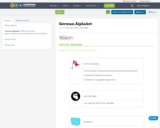
German Basics
- Subject:
- Arts and Humanities
- Languages
- Material Type:
- Lesson
- Date Added:
- 09/19/2018

German Basics

This OER, German: Arbeit und Leben / Work and Life, was remixed by Ashton Krueger as part of the 2024 World Language OER Summer work and training. Educators worked with Chrystal Liu, Nick Ziegler and Dorann Avey to create OER Learning Plans and materials.The attached Lesson Plan is designed for 9–12 World Language Arts teachers for Novice Learners of German. Students will learn about vocabulary which is according to work and life. They will interact with one another in a game of tic-tac-toe to consider what they would like their future to look like. This Lesson Plan addresses the following NDE World Language Standard(s): 1.1, 1.2, 1.3, 2.1, 2.2, and 4.1.It is expected that this Lesson Plan will take students 50 minutes to complete.

This OER, German: Berufe / Professions, was remixed by Ashton Krueger as part of the 2024 World Language OER Summer work and training. Educators worked with Chrystal Liu, Nick Ziegler, Dorann Avey to find and create OER Learning Plans and materials.The attached Lesson Plan is designed for 9-12 World Language Arts teachers for Novice Learners of German. Students will discuss what they look for in a career and what their dream job is. They will also describe what people with different careers do at work and what kind of personalities do well in these jobs as well as consider job salaries. This lesson plan addresses the following NDE World Language Standard(s): NE WL Standards: 1.1, 1.2, 1.3, 2.1, 2.2, 2.3, and 3.1. It is expected that this activity will take 50 minutes to complete.

The topic for Fall 2006 is short film and radio plays. This course investigates current trends and topics in German literary, theater, film, television, radio, and other media arts productions. Students analyze media texts in the context of their production, reception, and distribution as well as the public debates initiated by these works. The topic for Fall 2006 is German Short Film, a popular format that represents most recent trends in film production, and German Radio Art, a striving genre that includes experimental radio plays, sound art, and audio installations. Special attention will be given to the representation of German minorities, contrasted by their own artistic expressions reflecting changes in identity and a new political voice. Students have the opportunity to discuss course topics with a writer, filmmaker, and/or media artist from Germany. The course is taught in German.

This OER Myths and Legends (If a character lived now) was created by Yulia Evans and as part of the 2024 World Language OER Summer work and training. Educators worked with Chrystal Liu, Nick Ziegler and Dorann Avey to create OER Learning Plans and materials. The attached Lesson Activity “Myth and Legends (If a character lived now)” is designed for 9 - 12 World Language Arts teachers for Novice Learners of German. Students will reflect on the story they have read, choose a character, create a story through lens of modern life and present a story. This Lesson Plan addresses the following NDE World Language Standard(s): NE WL 1.1, 1.2, 1.3, 2.1, 2.2It is expected that this Lesson Activity will take students 40 minutes to complete.
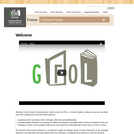
The German Frame-semantic Online Lexicon (G-FOL) is a prototype of a new kind of pedagogical dictionary. The goal is to help students learn how words are used in modern-day German. This online resource is different from traditional dictionaries and textbooks because it is based on the German FrameNet at the University of Texas at Austin, a digital archive of how German words are used in real life contexts. As such, students can easily access up-to-date information about the syntactic, semantic, and pragmatic contexts in which a German word appears. In addition, each lexical entry provides information about a word’s register, frequency, and related meanings. Thanks to G-FOL’s web-based architecture, the lexicon easily links to other pedagogical resources in digital format and can be updated with new words or new usages of existing words.

This OER assignment was created by Kelleen Rosebaugh and as part of the 2024 World Language OER Summer work and training. Educators worked with Chrystal Liu, Nick Zeigler and Dorann Avey to create OER Learning Plans and materials. The attached Lesson Plan is designed for 9 - 12 World Language Arts teachers for student learning of Mid/High Novice Learners of German. Students will read through an article with peers to understand a paragraph and share their understanding with peers. This Lesson Plan addresses the following NDE World Language Standard(s): NE.WL.2.1.B NE.WL.2.1.C NE.WL.1.3.A NE.WL.1.2.C NE.WL.1.2.D It is expected that this Lesson Plan will take students 45 minutes to complete.
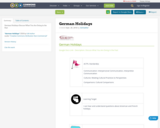
German Holidays
Discuss What You Are Doing in the Past

This course gives an introduction to German language and culture. The focus is on acquisition of vocabulary and grammatical concepts through active communication. Audio, video, and printed materials provide direct exposure to authentic German language and culture. A self-paced language lab program is fully coordinated with the textbook/workbook. The first semester covers the development of effective basic communication skills.

In this course students are exposed to history and culture of German-speaking countries through audio, video, and Web materials. It focuses on the expansion of basic communication skills and further development of linguistic competency, and includes the review and completion of basic grammar, building of vocabulary, and practice in writing short essays. Students will also read short literary texts.

This course expands skills in speaking, reading, listening, and writing. Students develop analytic and interpretative skills through the reading of a full-length drama as well as short prose and poetry (Biermann, Brecht, Dürrenmatt, Tawada and others) and through media selections on contemporary issues in German-speaking cultures. Coursework includes discussions and compositions based on these texts, and review of grammar and development of vocabulary-building strategies. It is recommended for students with two years of high school German.

This course focuses on development of interpretive skills, using literary texts (B. Brecht, S. Zweig) and contemporary media texts (film, TV broadcasts, Web materials). The emphasis is on discussion and exploration of cultural topics in their current social, political, and historical context via hypermedia documentaries. It also covers further refinement of oral and written expression and expansion of communicative competence in practical everyday situations.
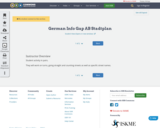
Student activity in pairs.They will work on turns, going straight and counting streets as well as specific street names.
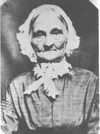
This is a set of three tasks for students to do to elaborate on understanding of Bertolt Brecht's Die Unwürdige GreisinThis would be over a few days- working on the interpersonal questions and intial reading in the first two days to activiate their prior knowledge about common family dynamics, and how they could be different now as opposed to 100+ years ago, then give students time to work on reading the entire text, finally having students create a conversation between the two brothers. This does not have comprehension questions for the entire text.
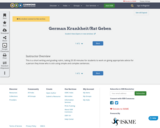
This is a short writing and grading rubric, taking 20-30 minutes for students to work on giving appropriate advice for a person they know who is sick using simple and complex sentences.

Students will go learn more about how conversation activities will be facilitated and introduce themselves to one another.

Description: Students will go through an orientation presentation and quiz to cover the activity rules and philosophies. They will also introduce themselves to the class.

Students will go learn more about how conversation activities will be facilitated and introduce themselves to one another. If there is enough time the students will strengthen their knowledge of the German alphabet by playing Hangman.
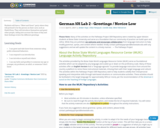
Students will have a “Meet and Greet” party where they will pretend to be the person on their card, such as Heidi Klum. They will introduce themselves and greet other people, taking into account the times of day and their feelings review the different greetings

I wanted students to have authentic examples of these greetings before they practice them so I added some videos of Germans greeting each other in various forms. I also wanted to add German music playing in the background just to give students a feeling of being in Germany.